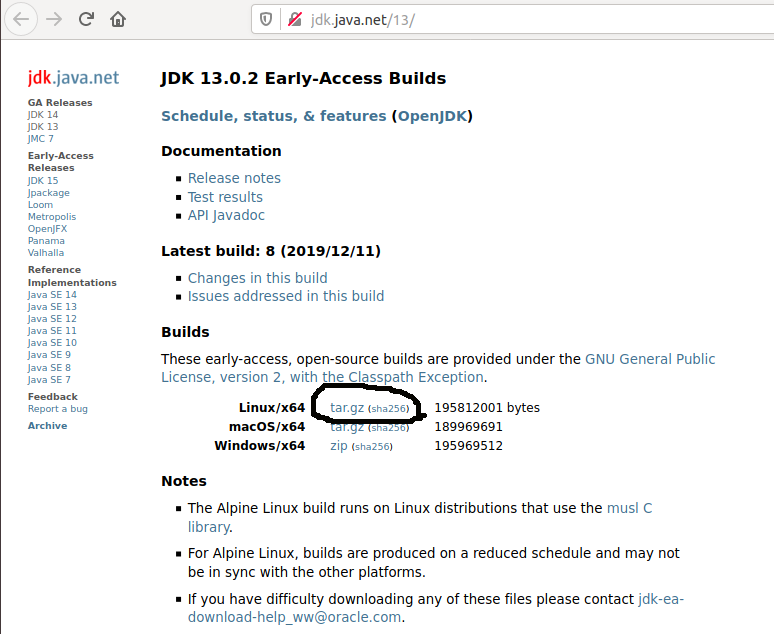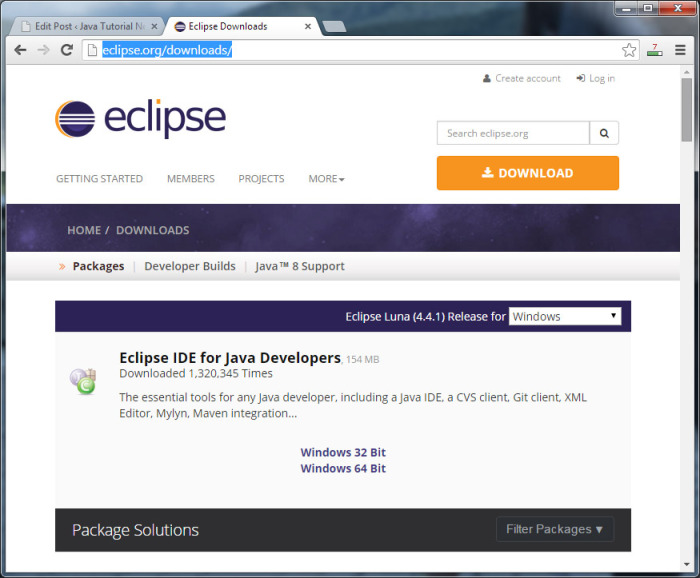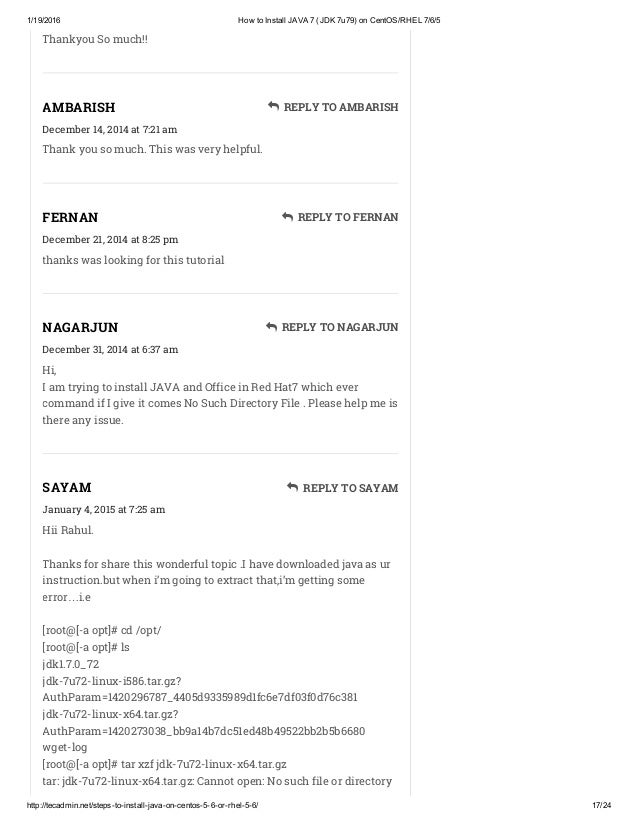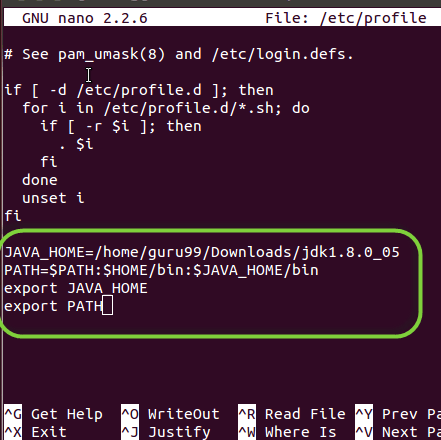Ensure you install JDK 8 (64-bit) or later. See JDK Installation Instructions.; Append jdkinstallationpath/bin (or jdkinstallationpathbin for Windows) in the PATH environment variable. See Setting the PATH Environment Variable for Windows or your operating system documentation for Linux and macOS.; Ensure that the hsperfdatausername directory is present in the. Tags are jdk-14.0.1+7, jdk-14.0.1-ga. Linux 64-bit: tar.gz 196 MB: Source: Tag is jdk-9.0.1+11. Mkdir /opt/jdk # uncompress, change to your file name: tar -zxf jdk-8u5-linux-x64.tar.gz -C /opt/jdk # check if files are there # ls /opt/jdk # update alternatives so the command java point to the new jdk: update-alternatives -install /usr/bin/java java /opt/jdk/jdk1.8.005/bin/java 100 # update alternatives so the command javac point to the.
- Como Instalar Jdk-7-linux-i586.tar.gz
- Jdk 7 Linux X64 Tar Gz Linux
- Jdk-7-linux-i586.tar.gz Download
- Jdk-7-linux-x64.tar.gz
Jdk-8u202-linux-x64.tar.gz; jdk-8u202-linux-x64-demos.tar.gz; jcepolicy-8.zip; Download the.tar.gz archives for Oracle Java 8u202 and the demos, and the JCE policy zip, put them in a folder called 'java' in your home, then install Oracle Java as you would normally with install-java.sh, and the demos and JCE policy will be installed along. The '-p' parameter creates all the folders needed for the 'jdk' folder. Move the tar.gz file (jdk-8u91-linux-x64.tar.gz) to the location you want to have the java installed, unpack the tarball and install the JDK.
See JDK 7 and JRE 7 Installation Guide for general information about installing JDK 7 and JRE 7.

For information on enhancements to JDK 7 that relate to the installer, see Installer Enhancements in JDK 7.
Contents
Note: For RPM-based Linux distributions, such as Red Hat or SuSE, refer to the RPM-based installation instructions.
System Requirements
Download bandicam kuyhaa. See Oracle JDK 7 and JRE 7 Certified Systems Configurations for information about supported platforms, operating systems, and browsers.
On a 64-bit system, you can download either the 64-bit or the 32-bit version of the Java platform. However, if you are using a 32-bit browser and you want to use the plugin, then you need to install the 32-bit version of the Java platform. To determine which version of Firefox you are running, launch the application, and select the menu item Help -> About Mozilla Firefox. At the bottom of the window is a version string line that contains either 'Linux i686' (32-bit) or 'Linux x86_64' (64-bit). To setup the Java plugin, see Manual Installation and Registration of Java Plugin for Linux.
JDK 7 Installation Instructions
Note: For any text on this page containing the following notation, you must substitute the appropriate JDK update version number for the notation. For example, if you are installing update JDK 7 update release 1, the following string representing the name of the bundle: would become:Note that, as in the preceding example, the number is sometimes preceded with the letter u, for example, 7u2, and sometimes it is preceded with an underbar, for example, jdk1.7.0_02.
The following table lists the options available for downloading the JDK 7 release on a Linux platform. The link in the first column takes you to the instructions for that version.
| Download File | Architecture | Who Can Install |
|---|---|---|
| jdk-7u-linux-x64.tar.gz | 64-bit | anyone |
| jdk-7u-linux-i586.tar.gz | 32-bit | anyone |
| jdk-7u-linux-x64.rpm | 64-bit RPM-based Linux | root |
| jdk-7u-linux-i586.rpm | 32-bit RPM-based Linux | root |
Installation can be performed using either of the following:
- Installation of Oracle Linux JDK using archive binaries (
.tar.gz) allows you to install a private version of the JDK for the current user into any location, without affecting other JDK installations. However, it may involve manual steps to get some of the features to work (for example, the-version:release option of thejavacommand which allows you to specify the release to be used to run the specified class requires the correct path to the JDK release under /usr/jdk). - Installation of Oracle Linux JDK using RPM packages allows you to perform a system-wide installation of the JDK for all users, and requires root access. RPM-based Linux platforms are based on Red Hat and SuSE.
Note: When you download and install the Java Development Kit (JDK), the associated Java Runtime Environment (JRE) is also installed.
JDK 7u6 and later releases include JavaFX SDK (version 2.2 or later). The JavaFX SDK and Runtime are installed and integrated into the standard JDK directory structure.
For information about how to work with JavaFX, see JavaFX Documentation.
Installation of the 64-bit JDK on Linux Platforms

This procedure installs the Java Development Kit (JDK) for 64-bit Linux, using an archive binary file (.tar.gz).
These instructions use the following file:
1. Download the file. Before the file can be downloaded, you must accept the license agreement. The archive binary can be installed by anyone (not only root users), in any location that you can write to. However, only the root user can install the JDK into the system location.
2. Change directory to the location where you would like the JDK to be installed. Move the .tar.gz archive binary to the current directory.
3. Unpack the tarball and install the JDK.
The Java Development Kit files are installed in a directory called jdk1.7.0_ in the current directory.
4. Delete the .tar.gz file if you want to save disk space.
Installation of the 64-bit JDK on RPM-based Linux Platforms
This procedure installs the Java Development Kit (JDK) for 64-bit RPM-based Linux platforms, such as Red Hat and SuSE, using an RPM binary file (.rpm) in the system location. You must be root to perform this installation.
These instructions use the following file:
1. Download the file. Before the file can be downloaded, you must accept the license agreement.
2. Become root by running su and entering the super-user password.
3. Uninstall any earlier installations of the JDK packages.
4. Install the package.
To upgrade a package:5. Delete the .rpm file if you want to save disk space.
6. Exit the root shell. No need to reboot.
Installation of the 32-bit JDK on Linux Platforms
This procedure installs the Java Development Kit (JDK) for 32-bit Linux, using an archive binary file (.tar.gz).
These instructions use the following file:
1. Download the file. Before the file can be downloaded, you must accept the license agreement. The archive binary can be installed by anyone (not only root users), in any location that you can write to. However, only the root user can install the JDK into the system location.
2. Change directory to the location where you would like the JDK to be installed. Move the .tar.gz archive binary to the current directory.
3. Unpack the tarball and install the JDK.
The Java Development Kit files are installed in a directory called jdk1.7.0_<version> in the current directory.
4. Delete the .tar.gz file if you want to save disk space.
Installation of the 32-bit JDK on RPM-based Linux Platforms
This procedure installs the Java Development Kit (JDK) for 32-bit RPM-based Linux platforms, such as Red Hat and SuSE, using an RPM binary file (.rpm) in the system location. You must be root to perform this installation.
These instructions use the following file:

Como Instalar Jdk-7-linux-i586.tar.gz
How to install and crack proteus. 1. Download the file. Before the file can be downloaded, you must accept the license agreement.
2. Become root by running su and entering the super-user password.
3. Uninstall any earlier installations of the JDK packages.
4. Install the package.
To upgrade a package:5. Delete the .rpm file if you want to save disk space.
6. Exit the root shell. No need to reboot.
General Installation Notes
Root Access
Installing the software automatically creates a directory calledjdk1.7.0_. Note that if you choose to install the Java SE Runtime Environment into system-wide location such as /usr/jdk, you must first become root to gain the necessary permissions. If you do not have root access, simply install the Java SE Runtime Environment into your home directory, or a subdirectory that you have permission to write to. Overwriting Files
If you install the software in a directory that contains a subdirectory named jdk1.7.0_, the new software overwrites files of the same name in that jdk1.7.0_ directory. Please be careful to rename the old directory if it contains files you would like to keep.System Preferences
By default, the installation script configures the system such that the backing store for system preferences is created inside the JDK's installation directory. If the JDK is installed on a network-mounted drive, it and the system preferences can be exported for sharing with Java runtime environments on other machines.See the Preferences API documentation for more information about preferences in the Java platform.
wget --no-cookies --header 'Cookie: gpw_e24=http%3A%2F%2Fwww.oracle.com' 'http://download.oracle.com/otn-pub/java/jdk/7u40-b43/jdk-7u40-linux-i586.tar.gz'curl -b gpw_e24=http%3A%2F%2Fwww.oracle.com -O -L http://download.oracle.com/otn-pub/java/jdk/7u17-b02/jre-7u17-linux-x64.tar.gzwget --no-cookies --no-check-certificate --header 'Cookie: gpw_e24=http%3A%2F%2Fwww.oracle.com' --header 'Cookie: oraclelicense=accept-securebackup-cookie' 'http://download.oracle.com/otn-pub/java/jdk/7u21-b11/jdk-7u21-linux-x64.rpmwget 'http://javadl.sun.com/webapps/download/AutoDL?BundleId=68234' -O java.tar.gz
sudo wget --no-cookies --header 'Cookie: gpw_e24=http%3A%2F%2Fwww.oracle.com' --header 'Cookie: oraclelicense=accept-securebackup-cookie' 'http://download.oracle.com/otn-pub/java/jdk/7u45-b18/jdk-7u45-linux-i586.tar.gz'
http://download.oracle.com/otn-pub/java/jdk/7u45-b18/jre-7u45-linux-i586.tar.gz
http://www.oracle.com/technetwork/java/javase/downloads/jre7-downloads-1880261.html
wget --no-cookies --header 'Cookie: gpw_e24=http%3A%2F%2Fwww.oracle.com' --header 'Cookie: oraclelicense=accept-securebackup-cookie' http://download.oracle.com/otn-pub/java/jdk/7u51-b13/jdk-7u51-linux-i586.tar.gz
JRE:
http://www.oracle.com/technetwork/java/javase/downloads/jre7-downloads-1880261.html
http://d.stavrovski.net/blog/post/installing-oracle-java-7-on-debian-wheezy
You can have both as I have on my Debian Wheezy, the open-source version of JAVA that is known as Icedtea and the one from Oracle that I'm going to install now.
The issue for me was that the icedtea-plugin was not playing nice with DELL's DRAC Console and for my wife was that she was unable to watch some java applet played vids online.
Ok, nonetheless, let's first make sure the system is up-to-date
apt-get update
apt-get upgrade
apt-get dist-upgrade
I'm using 64bit [amd64] version of Debian 7, so if you're not, make sure you tune the commands accordingly. Also, the URLs may change, so make sure you verify that aswell . Always get the latest version from here
Download JAVA 7 from Oracle's website using wget
wget --no-cookies
--no-check-certificate
--header 'Cookie: oraclelicense=accept-securebackup-cookie'
'http://download.oracle.com/otn-pub/java/jdk/7u55-b13/jdk-7u55-linux-x64.tar.gz'
-O /tmp/jdk-7-linux-x64.tar.gz
for 32 bit system you may use
wget --no-cookies
--no-check-certificate
--header 'Cookie: oraclelicense=accept-securebackup-cookie'
'http://download.oracle.com/otn-pub/java/jdk/7u55-b13/jdk-7u55-linux-i586.tar.gz'
-O /tmp/jdk-7-linux-i586.tar.gz
Unpack the downloaded JAVA 7 archive in /opt
mkdir /opt/java-oracle
tar -zxf /tmp/jdk-7-linux-x64.tar.gz -C /opt/java-oracle
Jdk 7 Linux X64 Tar Gz Linux
for 32 bit system use this instead
tar -zxf /tmp/jdk-7-linux-i586.tar.gz -C /opt/java-oracle
Set-up Oracle's JAVA 7 to be used on the system by using higher priority with update-alternatives
JHome=/opt/java-oracle/jdk1.7.0_55
update-alternatives --install /usr/bin/java java ${JHome%*/}/bin/java 20000
update-alternatives --install /usr/bin/javac javac ${JHome%*/}/bin/javac 20000
re-check JHome=/opt/java-oracle/jdk1.7.0_55 is set to the correct directory
Verify or set Oracle's JAVA 7 to be used as a default JAVA on the system
update-alternatives --config java

There are 3 choices for the alternative java (providing /usr/bin/java).
Selection Path Priority Status
————————————————————
0 /opt/java-oracle/jdk1.7.0/bin/java 20000 auto mode
1 /opt/java-oracle/jdk1.7.0/bin/java 20000 manual mode
2 /opt/java-oracle/jdk1.7.0_45/bin/java 20000 manual mode
* 3 /opt/java-oracle/jdk1.7.0_51/bin/java 20000 manual mode
4 /usr/lib/jvm/java-7-openjdk-amd64/jre/bin/java 1051 manual mode
check JAVA version using
java -version
java version '1.7.0_55'
Java(TM) SE Runtime Environment (build 1.7.0_55-b13)
Java HotSpot(TM) 64-Bit Server VM (build 24.55-b03, mixed mode)
64bit system
to enable JAVA plugin in chrome/chromium, do
mkdir /opt/google/chrome/plugins
ln -sf /opt/java-oracle/jdk1.7.0_55/jre/lib/amd64/libnpjp2.so /opt/google/chrome/plugins/
to achieve the same in firefox run
ln -sf /opt/java-oracle/jdk1.7.0_55/jre/lib/amd64/libnpjp2.so /usr/lib/firefox-addons/plugins/libnpjp2.so (/usr/lib/mozilla/plugins)
Rob Sargeant threw $.02 on this. (thanks Rob). He had to do:
Jdk-7-linux-i586.tar.gz Download
cd /usr/lib/
mkdir firefox-addons plugins
cd plugins
ln -sf /opt/java-oracle/jdk1.7.0_55/jre/lib/i386/libnpjp2.so /usr/lib/firefox-addons/plugins/libnpjp2.so

For information on enhancements to JDK 7 that relate to the installer, see Installer Enhancements in JDK 7.
Contents
Note: For RPM-based Linux distributions, such as Red Hat or SuSE, refer to the RPM-based installation instructions.
System Requirements
Download bandicam kuyhaa. See Oracle JDK 7 and JRE 7 Certified Systems Configurations for information about supported platforms, operating systems, and browsers.
On a 64-bit system, you can download either the 64-bit or the 32-bit version of the Java platform. However, if you are using a 32-bit browser and you want to use the plugin, then you need to install the 32-bit version of the Java platform. To determine which version of Firefox you are running, launch the application, and select the menu item Help -> About Mozilla Firefox. At the bottom of the window is a version string line that contains either 'Linux i686' (32-bit) or 'Linux x86_64' (64-bit). To setup the Java plugin, see Manual Installation and Registration of Java Plugin for Linux.
JDK 7 Installation Instructions
Note: For any text on this page containing the following notation, you must substitute the appropriate JDK update version number for the notation. For example, if you are installing update JDK 7 update release 1, the following string representing the name of the bundle: would become:Note that, as in the preceding example, the number is sometimes preceded with the letter u, for example, 7u2, and sometimes it is preceded with an underbar, for example, jdk1.7.0_02.
The following table lists the options available for downloading the JDK 7 release on a Linux platform. The link in the first column takes you to the instructions for that version.
| Download File | Architecture | Who Can Install |
|---|---|---|
| jdk-7u-linux-x64.tar.gz | 64-bit | anyone |
| jdk-7u-linux-i586.tar.gz | 32-bit | anyone |
| jdk-7u-linux-x64.rpm | 64-bit RPM-based Linux | root |
| jdk-7u-linux-i586.rpm | 32-bit RPM-based Linux | root |
Installation can be performed using either of the following:
- Installation of Oracle Linux JDK using archive binaries (
.tar.gz) allows you to install a private version of the JDK for the current user into any location, without affecting other JDK installations. However, it may involve manual steps to get some of the features to work (for example, the-version:release option of thejavacommand which allows you to specify the release to be used to run the specified class requires the correct path to the JDK release under /usr/jdk). - Installation of Oracle Linux JDK using RPM packages allows you to perform a system-wide installation of the JDK for all users, and requires root access. RPM-based Linux platforms are based on Red Hat and SuSE.
Note: When you download and install the Java Development Kit (JDK), the associated Java Runtime Environment (JRE) is also installed.
JDK 7u6 and later releases include JavaFX SDK (version 2.2 or later). The JavaFX SDK and Runtime are installed and integrated into the standard JDK directory structure.
For information about how to work with JavaFX, see JavaFX Documentation.
Installation of the 64-bit JDK on Linux Platforms
This procedure installs the Java Development Kit (JDK) for 64-bit Linux, using an archive binary file (.tar.gz).
These instructions use the following file:
1. Download the file. Before the file can be downloaded, you must accept the license agreement. The archive binary can be installed by anyone (not only root users), in any location that you can write to. However, only the root user can install the JDK into the system location.
2. Change directory to the location where you would like the JDK to be installed. Move the .tar.gz archive binary to the current directory.
3. Unpack the tarball and install the JDK.
The Java Development Kit files are installed in a directory called jdk1.7.0_ in the current directory.
4. Delete the .tar.gz file if you want to save disk space.
Installation of the 64-bit JDK on RPM-based Linux Platforms
This procedure installs the Java Development Kit (JDK) for 64-bit RPM-based Linux platforms, such as Red Hat and SuSE, using an RPM binary file (.rpm) in the system location. You must be root to perform this installation.
These instructions use the following file:
1. Download the file. Before the file can be downloaded, you must accept the license agreement.
2. Become root by running su and entering the super-user password.
3. Uninstall any earlier installations of the JDK packages.
4. Install the package.
To upgrade a package:5. Delete the .rpm file if you want to save disk space.
6. Exit the root shell. No need to reboot.
Installation of the 32-bit JDK on Linux Platforms
This procedure installs the Java Development Kit (JDK) for 32-bit Linux, using an archive binary file (.tar.gz).
These instructions use the following file:
1. Download the file. Before the file can be downloaded, you must accept the license agreement. The archive binary can be installed by anyone (not only root users), in any location that you can write to. However, only the root user can install the JDK into the system location.
2. Change directory to the location where you would like the JDK to be installed. Move the .tar.gz archive binary to the current directory.
3. Unpack the tarball and install the JDK.
The Java Development Kit files are installed in a directory called jdk1.7.0_<version> in the current directory.
4. Delete the .tar.gz file if you want to save disk space.
Installation of the 32-bit JDK on RPM-based Linux Platforms
This procedure installs the Java Development Kit (JDK) for 32-bit RPM-based Linux platforms, such as Red Hat and SuSE, using an RPM binary file (.rpm) in the system location. You must be root to perform this installation.
These instructions use the following file:
Como Instalar Jdk-7-linux-i586.tar.gz
How to install and crack proteus. 1. Download the file. Before the file can be downloaded, you must accept the license agreement.
2. Become root by running su and entering the super-user password.
3. Uninstall any earlier installations of the JDK packages.
4. Install the package.
To upgrade a package:5. Delete the .rpm file if you want to save disk space.
6. Exit the root shell. No need to reboot.
General Installation Notes
Root Access
Installing the software automatically creates a directory calledjdk1.7.0_. Note that if you choose to install the Java SE Runtime Environment into system-wide location such as /usr/jdk, you must first become root to gain the necessary permissions. If you do not have root access, simply install the Java SE Runtime Environment into your home directory, or a subdirectory that you have permission to write to. Overwriting Files
If you install the software in a directory that contains a subdirectory named jdk1.7.0_, the new software overwrites files of the same name in that jdk1.7.0_ directory. Please be careful to rename the old directory if it contains files you would like to keep.System Preferences
By default, the installation script configures the system such that the backing store for system preferences is created inside the JDK's installation directory. If the JDK is installed on a network-mounted drive, it and the system preferences can be exported for sharing with Java runtime environments on other machines.See the Preferences API documentation for more information about preferences in the Java platform.
wget --no-cookies --header 'Cookie: gpw_e24=http%3A%2F%2Fwww.oracle.com' 'http://download.oracle.com/otn-pub/java/jdk/7u40-b43/jdk-7u40-linux-i586.tar.gz'curl -b gpw_e24=http%3A%2F%2Fwww.oracle.com -O -L http://download.oracle.com/otn-pub/java/jdk/7u17-b02/jre-7u17-linux-x64.tar.gzwget --no-cookies --no-check-certificate --header 'Cookie: gpw_e24=http%3A%2F%2Fwww.oracle.com' --header 'Cookie: oraclelicense=accept-securebackup-cookie' 'http://download.oracle.com/otn-pub/java/jdk/7u21-b11/jdk-7u21-linux-x64.rpmwget 'http://javadl.sun.com/webapps/download/AutoDL?BundleId=68234' -O java.tar.gz
sudo wget --no-cookies --header 'Cookie: gpw_e24=http%3A%2F%2Fwww.oracle.com' --header 'Cookie: oraclelicense=accept-securebackup-cookie' 'http://download.oracle.com/otn-pub/java/jdk/7u45-b18/jdk-7u45-linux-i586.tar.gz'
http://download.oracle.com/otn-pub/java/jdk/7u45-b18/jre-7u45-linux-i586.tar.gz
http://www.oracle.com/technetwork/java/javase/downloads/jre7-downloads-1880261.html
wget --no-cookies --header 'Cookie: gpw_e24=http%3A%2F%2Fwww.oracle.com' --header 'Cookie: oraclelicense=accept-securebackup-cookie' http://download.oracle.com/otn-pub/java/jdk/7u51-b13/jdk-7u51-linux-i586.tar.gz
JRE:
http://www.oracle.com/technetwork/java/javase/downloads/jre7-downloads-1880261.html
http://d.stavrovski.net/blog/post/installing-oracle-java-7-on-debian-wheezy
You can have both as I have on my Debian Wheezy, the open-source version of JAVA that is known as Icedtea and the one from Oracle that I'm going to install now.
The issue for me was that the icedtea-plugin was not playing nice with DELL's DRAC Console and for my wife was that she was unable to watch some java applet played vids online.
Ok, nonetheless, let's first make sure the system is up-to-date
apt-get update
apt-get upgrade
apt-get dist-upgrade
I'm using 64bit [amd64] version of Debian 7, so if you're not, make sure you tune the commands accordingly. Also, the URLs may change, so make sure you verify that aswell . Always get the latest version from here
Download JAVA 7 from Oracle's website using wget
wget --no-cookies
--no-check-certificate
--header 'Cookie: oraclelicense=accept-securebackup-cookie'
'http://download.oracle.com/otn-pub/java/jdk/7u55-b13/jdk-7u55-linux-x64.tar.gz'
-O /tmp/jdk-7-linux-x64.tar.gz
for 32 bit system you may use
wget --no-cookies
--no-check-certificate
--header 'Cookie: oraclelicense=accept-securebackup-cookie'
'http://download.oracle.com/otn-pub/java/jdk/7u55-b13/jdk-7u55-linux-i586.tar.gz'
-O /tmp/jdk-7-linux-i586.tar.gz
Unpack the downloaded JAVA 7 archive in /opt
mkdir /opt/java-oracle
tar -zxf /tmp/jdk-7-linux-x64.tar.gz -C /opt/java-oracle
Jdk 7 Linux X64 Tar Gz Linux
for 32 bit system use this instead
tar -zxf /tmp/jdk-7-linux-i586.tar.gz -C /opt/java-oracle
Set-up Oracle's JAVA 7 to be used on the system by using higher priority with update-alternatives
JHome=/opt/java-oracle/jdk1.7.0_55
update-alternatives --install /usr/bin/java java ${JHome%*/}/bin/java 20000
update-alternatives --install /usr/bin/javac javac ${JHome%*/}/bin/javac 20000
re-check JHome=/opt/java-oracle/jdk1.7.0_55 is set to the correct directory
Verify or set Oracle's JAVA 7 to be used as a default JAVA on the system
update-alternatives --config java
There are 3 choices for the alternative java (providing /usr/bin/java).
Selection Path Priority Status
————————————————————
0 /opt/java-oracle/jdk1.7.0/bin/java 20000 auto mode
1 /opt/java-oracle/jdk1.7.0/bin/java 20000 manual mode
2 /opt/java-oracle/jdk1.7.0_45/bin/java 20000 manual mode
* 3 /opt/java-oracle/jdk1.7.0_51/bin/java 20000 manual mode
4 /usr/lib/jvm/java-7-openjdk-amd64/jre/bin/java 1051 manual mode
check JAVA version using
java -version
java version '1.7.0_55'
Java(TM) SE Runtime Environment (build 1.7.0_55-b13)
Java HotSpot(TM) 64-Bit Server VM (build 24.55-b03, mixed mode)
64bit system
to enable JAVA plugin in chrome/chromium, do
mkdir /opt/google/chrome/plugins
ln -sf /opt/java-oracle/jdk1.7.0_55/jre/lib/amd64/libnpjp2.so /opt/google/chrome/plugins/
to achieve the same in firefox run
ln -sf /opt/java-oracle/jdk1.7.0_55/jre/lib/amd64/libnpjp2.so /usr/lib/firefox-addons/plugins/libnpjp2.so (/usr/lib/mozilla/plugins)
Rob Sargeant threw $.02 on this. (thanks Rob). He had to do:
Jdk-7-linux-i586.tar.gz Download
cd /usr/lib/
mkdir firefox-addons plugins
cd plugins
ln -sf /opt/java-oracle/jdk1.7.0_55/jre/lib/i386/libnpjp2.so /usr/lib/firefox-addons/plugins/libnpjp2.so
Jdk-7-linux-x64.tar.gz
to enable the JAVA plugin in his firefox
+++++++++wget --no-cookies --no-check-certificate --header 'Cookie: oraclelicense=accept-securebackup-cookie' http://download.oracle.com/otn-pub/java/jdk/7u55-b13/jre-7u55-linux-i586.tar.gz -O /usr/portage/distfiles/jre-7u55-linux-i586.tar.gz
$jcontrol
Important!!! For now, you should continue to use Java 8 because Oracle Java 9 is available as an early access release (it should be released in 2016)! You should only use Oracle Java 9 if you explicitly need it, because it may contain bugs and it might not include the latest security patches! Also, some Java options were removed in JDK9, so you may encounter issues with various Java apps. More information and installation instructions (Ubuntu / Linux Mint / Debian): http://www.webupd8.org/2015/02/install-oracle-java-9-in-ubuntu-linux.html
More info: https://launchpad.net/~webupd8team/+archive/ubuntu/java
